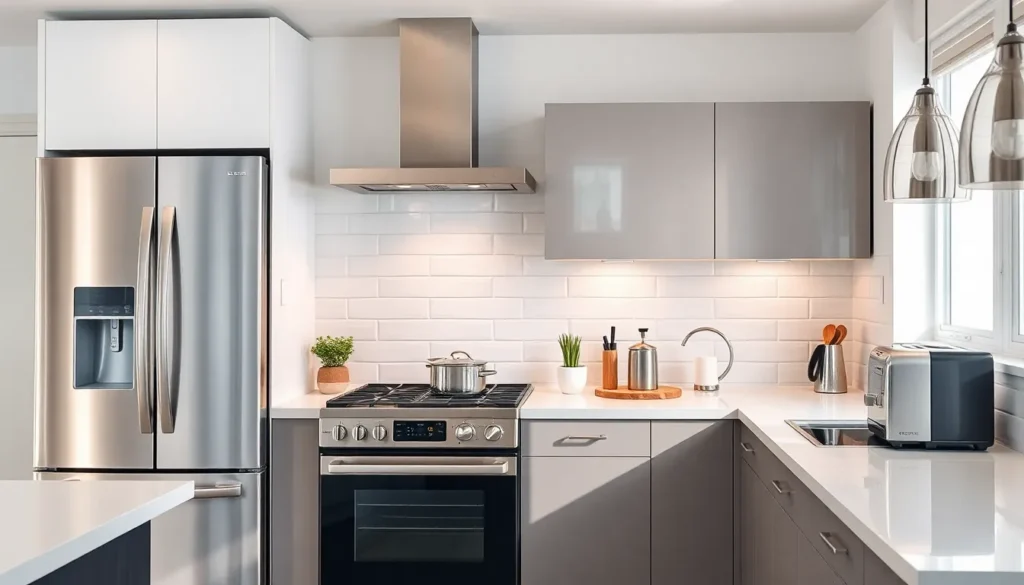Table of Contents
ToggleIn a world where your refrigerator can text you when it’s running low on milk, smart appliances are no longer just a sci-fi dream—they’re a reality. These high-tech gadgets not only make life easier but also promise to save energy and cut costs. Who knew that upgrading your toaster could lead to a more efficient home?
Understanding Smart Appliance Efficiency
Smart appliances represent a blend of innovation and practicality. These devices enhance daily tasks while promoting energy efficiency.
Definition of Smart Appliances
Smart appliances refer to devices equipped with internet connectivity and advanced technology. Such appliances include refrigerators, washers, and ovens that communicate with users and each other. They often utilize sensors and machine learning to optimize performance. Smart features enable remote monitoring and control, allowing users to adjust settings conveniently through smartphones or smart home systems. These capabilities improve not only functionality but also overall energy savings.
Importance of Efficiency in Appliances
Efficiency in appliances significantly impacts energy consumption and household budgets. High-efficiency appliances reduce electricity and water usage, which lowers utility bills. They often come with ratings like ENERGY STAR that certify their performance. Users benefit from less environmental impact as these appliances contribute to resource conservation. Adopting efficient devices leads to long-term savings and enhances overall home comfort. Smart technology further optimizes usage patterns, leading to smarter energy management.
Benefits of Smart Appliance Efficiency
Smart appliances provide numerous advantages that significantly enhance home performance. They offer efficiency in energy use and reduce overall costs.
Energy Savings
Smart appliances optimize energy consumption through advanced technologies. Sensors detect usage patterns and adjust operation accordingly, leading to energy savings of 10% to 50%. For instance, smart thermostats analyze household habits and automatically adjust heating or cooling, ensuring minimal waste. Additionally, appliances with ENERGY STAR certifications often consume less electricity than their standard counterparts. Such efficiency not only lowers utility bills but also contributes to environmental sustainability, making a positive impact on energy resources.
Cost-Effectiveness
Investing in smart appliances can result in long-term savings beyond initial costs. While upfront prices might be higher, the reduction in energy consumption leads to lower utility expenses over time. Smart devices often feature maintenance reminders, preventing costly repairs and extending the lifespan of appliances. Remote monitoring allows users to control energy usage, optimizing costs even further. Moreover, home resale values typically increase when equipped with efficient appliances, making them a wise investment choice for homeowners.
Factors Influencing Smart Appliance Efficiency
Multiple factors impact the efficiency of smart appliances. Understanding these variables helps maximize energy savings and overall performance.
Technology Integration
Technology integration plays a crucial role in smart appliance efficiency. Advanced sensors and machine learning capabilities enable appliances to adapt to user habits. For instance, smart refrigerators can monitor food inventory and adjust cooling based on usage patterns, leading to energy consumption reductions of up to 30%. Connectivity with home networks allows for centralized control, optimizing performance further. Compatibility with other smart devices enhances this efficiency, enabling seamless energy management across all appliances. Collectively, these technologies create a more responsive home environment.
User Behavior
User behavior significantly affects the efficiency of smart appliances. Regular interaction with these devices influences their performance and energy consumption. For example, users who set appropriate schedules for smart washing machines optimize energy use, resulting in savings of 20% to 50%. Moreover, engaging with energy monitoring tools available in smart appliances helps identify wasteful practices. Adopting energy-efficient habits, like running appliances during off-peak hours, leads to further reductions in utility costs. Overall, understanding and adjusting user behavior maximizes the benefits that smart appliance efficiency offers.
Evaluating Smart Appliance Efficiency
Understanding how to evaluate smart appliance efficiency highlights the importance of making informed decisions when selecting energy-efficient devices. Key factors include Energy Star ratings and performance standards, which help determine an appliance’s effectiveness.
Energy Star Ratings
Energy Star ratings provide a reliable benchmark for evaluating energy efficiency. Appliances with this label meet strict efficiency guidelines set by the U.S. Environmental Protection Agency. High-efficiency products can save users up to 30% on energy costs compared to non-Energy Star models. When shopping for new appliances, selecting those with these ratings promotes environmental sustainability and reduces monthly utility bills. Additionally, an Energy Star rating can indicate long-term durability, ensuring that the investment remains worthwhile over time.
Performance Standards
Performance standards establish the minimum efficiency levels required for specific appliance categories. These standards are designed to minimize energy consumption while ensuring optimal functionality. Appliances such as refrigerators and washers must meet rigorous criteria to qualify for energy efficiency. Consumers benefit from these regulations, as they correlate with lower operational costs and reduced environmental impact. Regular assessments of performance standards can drive innovation, leading to the development of more advanced technologies that enhance efficiency in smart appliances.
Future Trends in Smart Appliance Efficiency
Future advancements promise to further enhance smart appliance efficiency. Companies focus on innovations that improve user experience while promoting energy savings.
Innovations in Technology
New technologies emerge rapidly in the smart appliance sector. Smart appliances now leverage artificial intelligence to learn user habits, optimizing energy use in real time. For instance, connected ovens can adjust cooking times based on historical data, leading to energy reductions of 15%. Some appliances are integrating voice control and IoT capabilities, allowing seamless operation through smartphones or smart speakers. Enhanced sensors also contribute to efficiency by providing precise tracking of energy consumption, enabling users to adjust settings for optimal performance. This continuous evolution reflects a broader trend towards creating connected environments that minimize energy waste through proactive adjustments.
Sustainability Focus
Sustainability remains a cornerstone in the development of smart appliances. Manufacturers prioritize eco-friendly materials and energy-efficient designs to minimize environmental impact. For example, smart dishwashers utilize advanced algorithms to optimize water usage, achieving reductions of up to 30% per cycle. As regulations increase, companies are adopting sustainable practices that align with consumer demand for greener solutions. Energy-efficient appliances not only decrease utility bills but also contribute to a lower carbon footprint, responding to the growing emphasis on environmental responsibility. Commitment to sustainability helps brands distinguish themselves in the market while addressing the urgent need for responsible consumption.
Conclusion
Smart appliance efficiency represents a significant leap toward a more sustainable and cost-effective future. By embracing these advanced technologies homeowners can optimize energy usage and enhance overall home performance. The integration of features like Energy Star ratings and machine learning not only simplifies daily tasks but also leads to substantial savings on utility bills.
As manufacturers continue to innovate and prioritize sustainability smart appliances will only become more efficient. Homeowners who invest in these devices today are not just upgrading their homes but also contributing to a greener planet. With the right choices and habits these appliances can transform the way energy is consumed in households across the nation.








